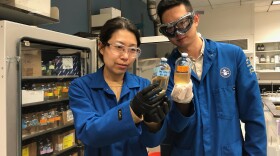-
As the Trump administration tries to cut down on spending, some small biotech companies in the Mountain West are getting caught in the crosshairs.
-
Paleontologists collaborated with members of the Eastern Shoshone Tribe to honor the fact that the dinosaur was found on the tribe’s ancestral lands. We hear how the project braided together two different ways of knowing from an Eastern Shoshone elder and a research scientist.
-
Wildfires are often talked about in terms of the acres they burn, or the number of structures they destroy. New research is bringing attention to their speed – and evidence that they’re accelerating.
-
Earlier this month, a heat wave broke records across the country and also hit Wyoming hard. Most counties in the eastern part of the state were under heat advisories for multiple days. But the heat didn’t just impact air temperatures, it also took a toll on water ecosystems. The increased heat is impacting rivers, fish and the guides that rely on them.
-
Last month, the Bureau of Land Management released a five-year Crowdsourcing and Citizen Science Action Plan. The basic idea is to get more members of the public involved in scientific research that helps the agency better manage the many millions of acres under its control.
-
Wildlife managers across the West have been stocking high, alpine lakes with fish for decades. New research is looking into how that history changed the Rocky Mountain environment and the genetics of the fish themselves.
-
Wildlife managers across the West have been stocking high, alpine lakes with fish for decades. New research is looking into how that history changed the Rocky Mountain environment and the genetics of the fish themselves.
-
Yellowstone National Park scientists are using a unique tool to help them reconstruct the highways demolished by last year’s floods. LIDAR uses a laser to let researchers map the land surface under the trees, water, and ground cover.
-
There’s a lot of concern about PFAS chemicals that have seeped into waterways in the Mountain West. But some researchers are finding that bacteria can help clean them up.
-
Ticks are actually considered the second most ‘dangerous’ creature in the world when it comes to transmitting disease – only behind mosquitoes. It is not just Bond that has noticed the increase this year, many are saying that anecdotally it is a big tick year in western Wyoming, which is especially of concern in Sublette County, where there is the highest rate of tick fever disease in the country.
© 2026 Wyoming Public Media
800-729-5897 | 307-766-4240
Wyoming Public Media is a service of the University of Wyoming
800-729-5897 | 307-766-4240
Wyoming Public Media is a service of the University of Wyoming

Play Live Radio
Next Up:
0:00
0:00
Available On Air Stations










